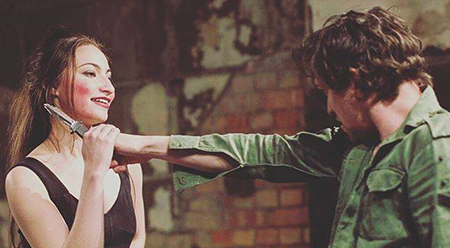 Recent U.S. news reported on clowns – the red-nosed, circus kind – scaring the public through acts such as lurking around train stations at night. Some theorise that clowns are disconcerting as we are unable to read their facial expressions. Roberto Zucco by French playwright Bernard-Marie Koltès insinuates that other threats to polite society aren’t nearly so obvious.
Recent U.S. news reported on clowns – the red-nosed, circus kind – scaring the public through acts such as lurking around train stations at night. Some theorise that clowns are disconcerting as we are unable to read their facial expressions. Roberto Zucco by French playwright Bernard-Marie Koltès insinuates that other threats to polite society aren’t nearly so obvious.
Roberto Zucco presented by company le poulet terrible is a translation by English playwright Martin Crimp. The play was a slippery, perplexing piece of work at times, yet one with darkly comic moments.
Roberto Zucco was Koltès’ last play, inspired by the criminal life of Italian Roberto Succo. This began with the fatal stabbing of his parents shortly after his 19th birthday. Following incarceration, earning a political science degree, and escape, Succo resumed his violent path, which included murdering police officers and teenage girls. The play was written in 1988, the year of Succo’s suicide in prison, and echoes some of his life’s significant chapters.
We first meet Zucco (Ben Schumann, House Husbands) following his escape from imprisonment for throwing his father through an upstairs window. This, and dealings with his mother (Alice Bishop) quickly establish his lack of regard for social conventions.
Amongst other things, the performance was billed as a psychological thriller. This suggested periods of suspense over how Zucco would respond to his situation. I found that sometimes our protagonist’s words or actions worked against this. One scene where Zucco could have easily gotten away with a violent act was robbed of tension as he was implacably neutral whilst commenting on the importance of being invisible. Other scenes telegraphed their violent apex.
As Zucco displayed inconsistency of action, but not hints of his decision process, I was unable to understand his motivations. After some thought, the best partial explanation I can find for his choices was that, whether taunting prison guards, killing a police officer on the street or his parents, he needed to defy authority, which he often (but not always) did by performing for an audience. To accept this reading fully, we require greater evidence that Zucco reaches a point where he is sick of trying to blend in, but the characterisation didn’t convince me of this.
I found the description of Roberto Zucco as “absurdly comic” far more accurate, and Bishop’s direction had a good handle on this. A scene between a bored, well-heeled mother (Elizabeth Thomson, The Doctor) and Schumann confronted us with the enduring appeal of the “bad boy” figure.
Thomson’s pointed, demeaning rebukes of Schumann and his haphazard efforts to rob her showed a frustrated young man who doesn’t think ahead all that much. Thomson’s willingness to overlook this given his physical attractiveness and the excitement of his audacity caused the dark – but often rather dry – humour seen previously to burst through into laugh out loud territory for many in the audience.
There were notable contributions across the ensemble. A scene where “Melancholy Detective” Matthew Molony (Cuckoo) consorted with prostitutes (Bishop, Thomson, and Belinda Misevski, Macbeth) gave insight into a world where relationships are only as valuable as the income they generate.
The story arc of The Girl, (Emina Ashman, Tales of a City by the Sea) continued this theme. Her future depends on her virginity, vigilantly protected by older siblings The Brother (David Kambouris, Cuckoo) and The Sister (also Misevski). By asserting her independence through liaison with Zucco, The Girl upset these roles, abruptly becoming a different type of commodity. Despite her feistiness, scenes of Ashman’s disempowerment were disturbing, recalling the perception of women as male property in some parts of the world
The setting was an inspired means of priming us for a visit to an urban underworld. Following our descent to a smallish gloomy basement of grimy walls, Spatial Designer Efterpi Soropos compelled the space to take on a range of moods. Proximity to the players made us feel like we were in The Brother’s drug den, or watching The Sister deliver her heartfelt monologue in the rain on the vileness of men as if under a streetlight in grittiest Film Noir.
My attempts to reconcile the disparate pieces of Roberto Zucco were something of distraction from the developing story. Aside from Zucco, all characters were red-cheeked with slapdash makeup. Are these characters all performers, each somebody’s clown? Is it only Zucco the psychopath who is his own person? I suspect that some of the themes will emerge more clearly as the season proceeds and some character trajectories become more sharply defined.
However, the Koltès-Crimp view of the world projected in this opening night performance still presented us with meaty issues to chew over upon our ascent from the basement. Even a casual following of Australian politics shows that many public figures conceal their true beliefs or self-interest under a mask. Perhaps we might get a better understanding of our society’s ills by listening to outsiders like Zucco who have nothing to lose.
Roberto Zucco
Alliance Française, 51 Grey Street, St Kilda
Performance: Thursday 27 October 2016 – 7:30pm
Season continues to 13 November 2016
Information and Bookings: www.lamama.com.au
Image: Roberto Zucco – photo courtesy of La Mama
Review: Jason Whyte
